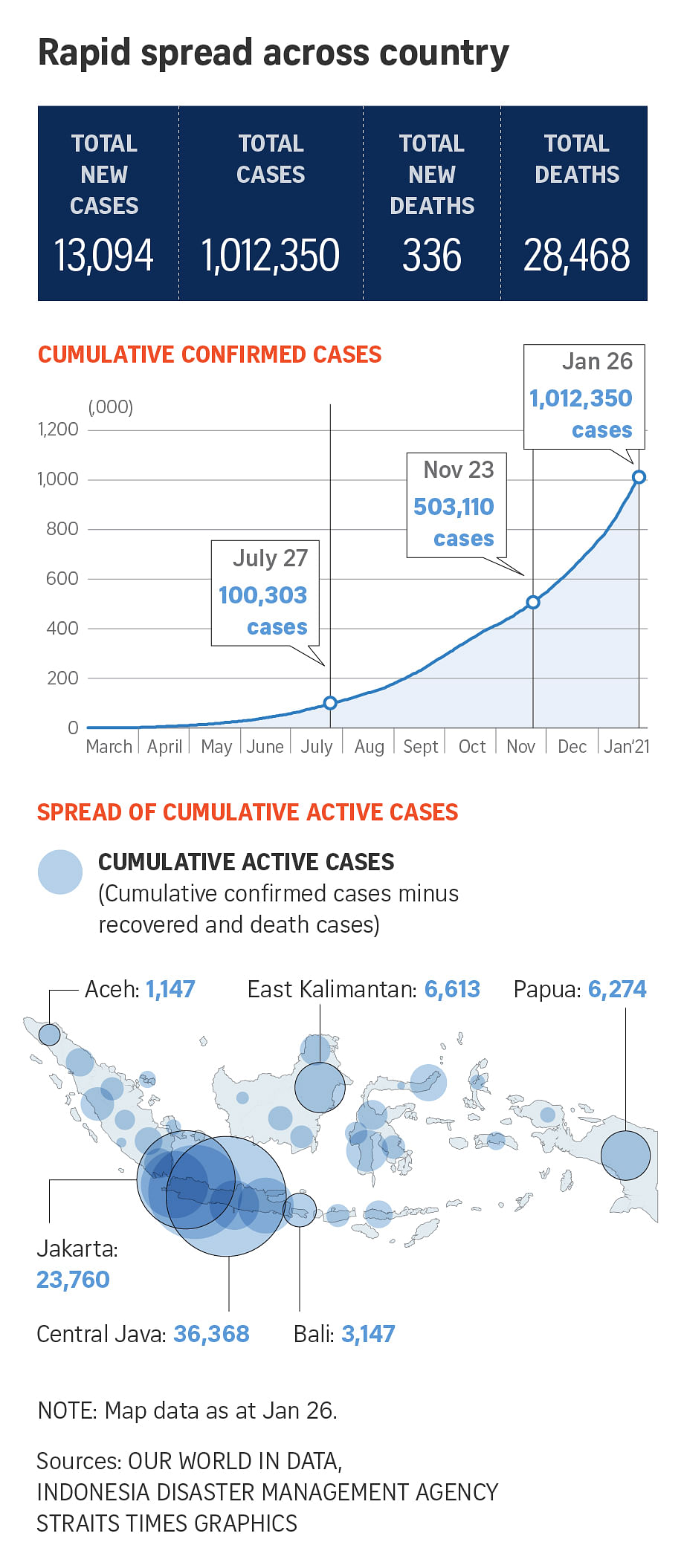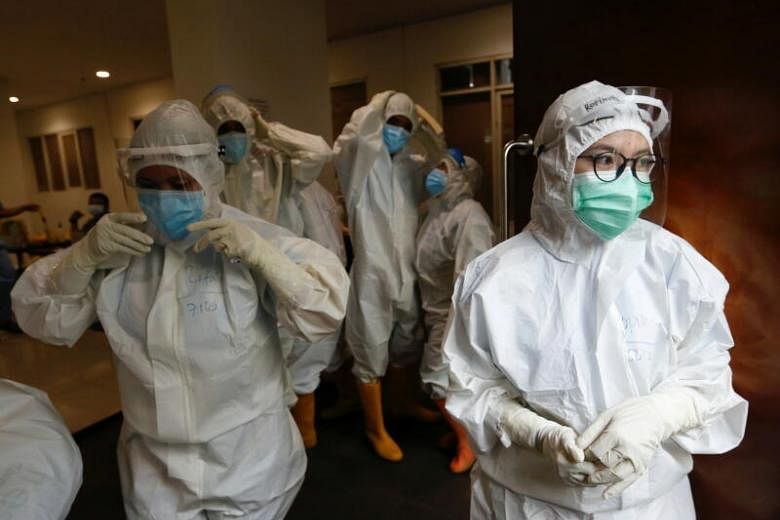JAKARTA - Indonesia has passed one million coronavirus cases as hospitals are pushed to the brink, straining under the pandemic which has gripped the world's fourth most populous nation since last March.
The country recorded 1.01 million cases as of Tuesday (Jan 26), after seeing 13,094 infections in the past 24 hours. Overall deaths stood at 28,468.
Across Indonesia, stories of patients - even those seeking life-and-death medical help - being bounced around by overwhelmed hospitals have sadly become commonplace.
IT professional Tia lost her grandmother to Covid-19 after a long search for a hospital bed.
The 28-year-old and her uncle tested positive for the disease on New Year's Eve. Then, a day later, her grandmother began to wheeze.
They searched in vain for a room for the 80-year-old at five hospitals in the city of Depok, West Java, and neighbouring Jakarta. The fifth hospital they tried had about 30 patients in its waiting list.
At home, the elderly woman with hypertension was treated with medical oxygen before she weakened. On Jan 4 her relatives checked with six Depok hospitals, but they were fully-occupied. Fortunately, her family later managed to get her admitted to a Jakarta hospital. But her health indicators, such as oxygen saturation, worsened and she died on Jan 6.
"Like other families whose members were infected by the Covid-19, we felt we were not ready to lose her too early," Ms Tia, who declined to give her full name, told The Straits Times. "Perhaps, it would have been better if many more (hospital) rooms were available so that critical patients could be handled quickly."
Indonesian hospitals have increasingly been overwhelmed by the massive influx of Covid-19 patients, even as it has imposed tighter restrictions across Java, the country's most populous island, and Bali since Jan 11, and epidemiologists have feared the potential collapse of its healthcare system.
Since the end of last December, citizen coalition LaporCovid-19 has received at least 34 reports from Greater Jakarta, West Java, Central Java and East Java of patients rejected by fully-occupied hospitals, passing away while travelling to find hospitals or dying at home after being turned away. One family in Depok, for instance, reported that on Jan 3 a relative died in a taxi after being rejected by ten Covid-19 referral hospitals.
While much effort is now dedicated to an ongoing national vaccination programme, the government should continue to curb the pandemic through testing and contact tracing and make sure its residents adhere to health protocols, while also restricting their mobility, epidemiologists have warned.
"People have been advised to wear masks, keep safe distance and wash their hands, but the diverse educational and economic backgrounds affect the level of awareness," said Mr Hermawan Saputra from the Indonesian Public Health Expert Association. "Returning to the large-scale social restrictions is necessary to lower the number of cases. That's the way to ease the burden of our health facilities and health workers."
Health Minister Budi Gunadi Sadikin on Tuesday underlined the need to improve the way the pandemic is tackled, while also urging people to comply with health protocols.
"The Health Ministry will work very hard to ensure testing, contact tracing and isolation of those infected will be carried out immediately. The goal is flattening the curve," he told a press conference.
The country, which is struggling with the worst outbreak in South-east Asia, reported three record numbers of deaths in a span of eight days - 308 last Tuesday, 346 last Thursday and 336 on Tuesday - as its hospitals face escalating pressure from the pandemic.
A Jakarta-based doctor treating Covid-19 patients described the two hospitals where she was working as having been "hectic and overloaded" since mid-December.
In one of them, a newly-opened ward with around 20 beds, was full soon after its opening. The other hospital, despite doubling its capacity, still had a queue of more than 15 patients for intensive care units.
"We are exhausted physically and mentally," the doctor told the ST. "We are afraid all parties become complacent because of the vaccination."
She pointed out the potential for government policy flip-flops to contribute to the soaring number of cases and complacency from the general public.


Dr Sutrisno, the chairman of East Java's chapter of the Indonesian Medical Association, said 385 hospitals across the province of 42 million people were overflowing with Covid-19 patients.
"The occupancy rate is above 90 per cent. Some hospitals are full and close admission of new patients," he told the ST. "Patients are stranded in emergency rooms because there's no more space."
Ms Tia said after what happened to her family, she now viewed Covid-19 in a way that went beyond the statistics.
"Those passing away are not just numbers," she said. "They are someone's beloved ones, just like my grandmother to me."















